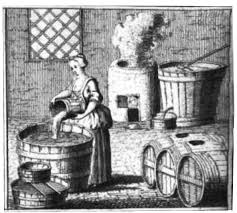 My most recent Planet S Magazine column (which you can read in its entirety here) was inspired by Paddock Wood’s summer release Black Friars. They bill it a “17th century porter” and I am told by the good folks there they took a few steps to try to recreate what a porter might taste like in the 1600s. For one, they roasted their own malt, reportedly on Stephen Cavan’s backyard barbeque. They also dosed it with Brettanomyces to impart some of that wild yeast character that would have undoubtedly been a part of every beer made back then.
My most recent Planet S Magazine column (which you can read in its entirety here) was inspired by Paddock Wood’s summer release Black Friars. They bill it a “17th century porter” and I am told by the good folks there they took a few steps to try to recreate what a porter might taste like in the 1600s. For one, they roasted their own malt, reportedly on Stephen Cavan’s backyard barbeque. They also dosed it with Brettanomyces to impart some of that wild yeast character that would have undoubtedly been a part of every beer made back then.
The column was born as I was sipping it (I also turned that tasting into a review post, which you can find here). We all know historical porter tastes very little like porters today – and Black Friars was a fascinating attempt to replicate at least a portion of what an historic porter might taste like. But how much thought do we give to the link between other styles and their ancestors. Take pilsner, for example. Sure it was likely golden and bright in the early 1800s, but was it really as clean and crisp as we expect today? Maybe for the first few weeks. But after that? I am not so sure.
Lots of styles boast a proud history, from weizens to pale ales to Munich dunkels to bocks and many more. We revel in their history – as we should, for it is a link across generations of beer lovers. But how much do today’s versions really reflect what was originally designed? Hence the column.
There are just too many variables that have changed. The most obvious is microbiology and sanitation. But there are also the advances in malting, hop farming and preservation, mash temperature control, force carbonation, sterile packaging, yeast science, equipment design … the list goes on and on.
The lesson is that we can’t really imagine what our favourite beer styles tasted like two or three hundred years ago. The scope of the changes is just too massive for us to comprehend.
This is not a criticism of Paddock Wood or any other brewer who attempts an historical interpretation. Quite the opposite, actually. I admire their spirit of experimentation and historical curiousity. It is simply a recognition that things have moved so far, so fast, that we have lost touch of our historical roots. We can’t really know what beer tasted like back when beer was young (or maybe kind of middle-aged, since it has been around a long time).
I hope more breweries experiment with historical interpretations. It is a fascinating exploration of beer’s origins. Let’s just not think that we are drinking the same thing the real London dock porters were drinking in the 1700s.


Leave a Reply